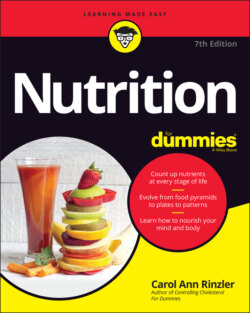Читать книгу Nutrition For Dummies - Carol Ann Rinzler - Страница 20
Nutrition people
ОглавлениеNot every piece of nutrition news is nutritious. The person who makes the news may simply have wandered in with a new theory — “Artichokes cure cancer!” “Never eat cherries and cheese at the same meal!” “Women who take vitamin C are more likely to give birth to twins!” The more bizarre, the better.
Those most likely to give you news you can use with confidence are
Nutrition scientists and researchers: These are people with undergraduate or graduate degrees in science subjects, such as chemistry, biology, biochemistry, or physics, and are engaged in research dealing primarily with the biological effects of food on animals and human beings. Some nutrition investigators come from other fields entirely, such as a historian or sociologist, whose research concentrates on food history and habits.
Dietitians and nutritionists: These people have undergraduate degrees in food and nutrition science or the management of food programs. A person with the letters RD (registered dietitian) after his name has completed a dietetic internship and passed an American Dietetic Association licensing exam. In some states, a person who claims the title “nutritionist” must have a graduate degree in basic science courses related to nutrition.
Nutrition reporters and writers: These are people who specialize in giving you information about the medical and/or scientific aspects of food. Most have the science background required to translate technical information into language nonscientists can understand. Some have been trained as dietitians, nutritionists, or nutrition scientists; others gain their expertise through years of covering their beat.
Regardless of the source, nutrition news should always pass what you might call The Reasonableness Test. In other words, if a story or report or study or theory sounds ridiculous, as in the earlier examples, it probably is.
